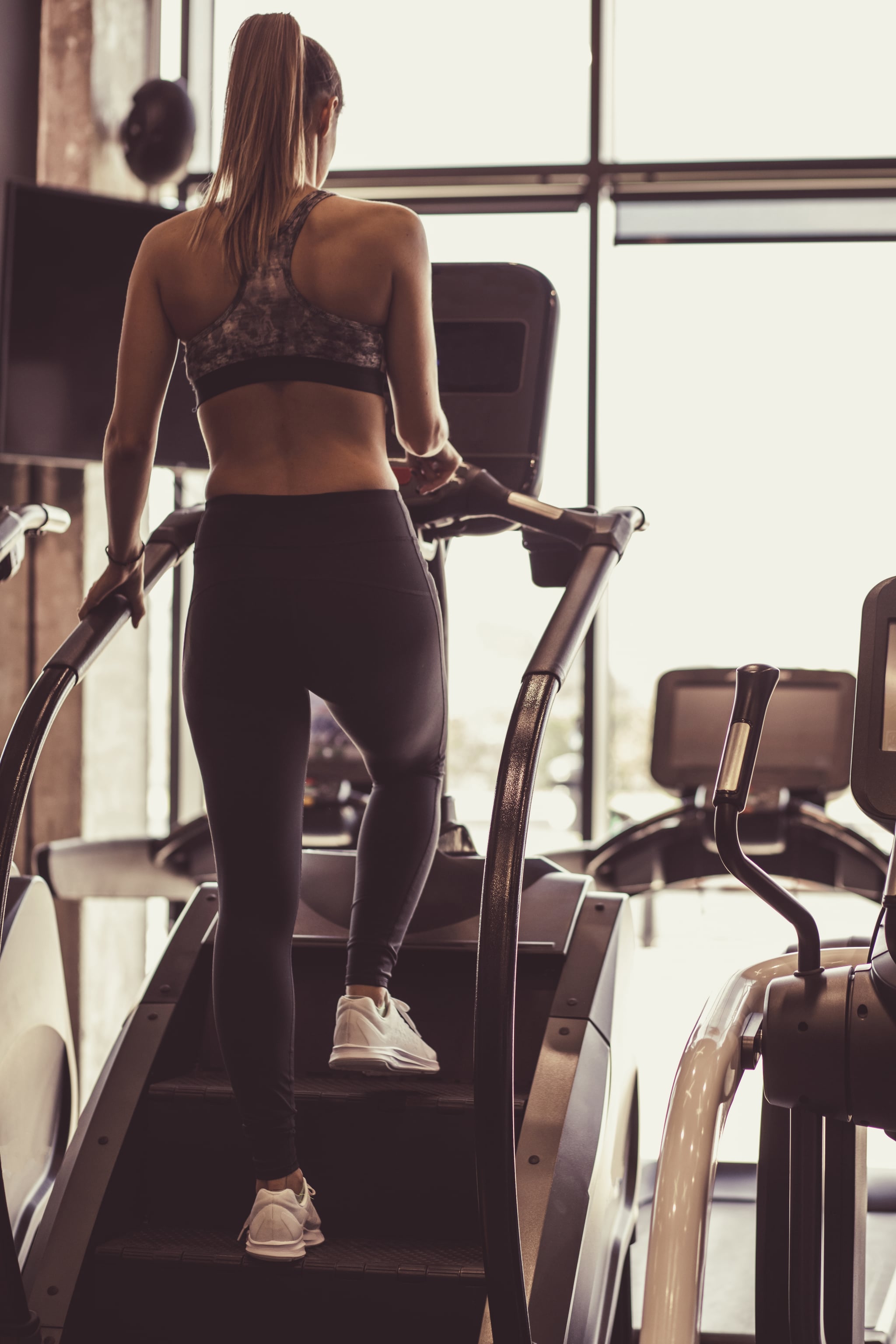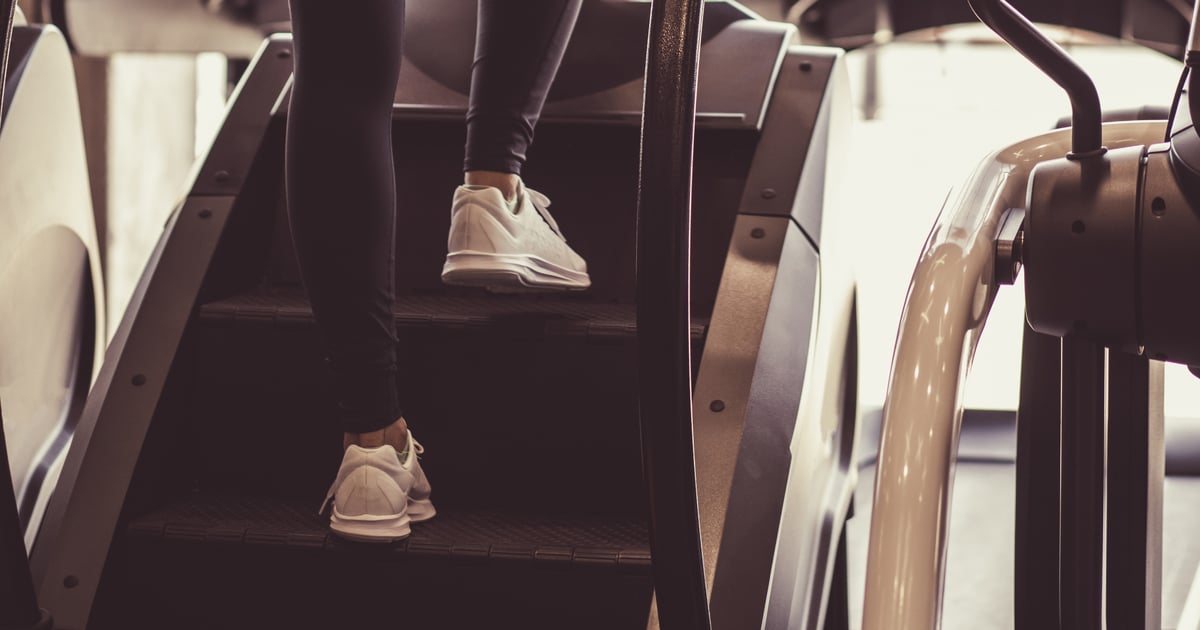 Image Source: Getty / fotostorm
Image Source: Getty / fotostorm
When it comes to cardio equipment at the gym, you’ll typically find rows of treadmills and ellipticals at the ready, some stationary and recumbent bikes, and a rower or two if you’re lucky. But you don’t want to ignore one of the classics (and likely one of the largest) tools in the room: the stair climber, or the StairMaster, if you’re talking about the popular brand name. (A quick note: This story uses stair climbers and the StairMaster to refer to the equipment with moving stairs, also called a stair mill. This does not discuss the tool that keeps feet on the same pedal as you move in a climbing motion.)
A set of moving stairs going nowhere might seem like a boring way to exercise, but think of it like indoor hiking. You’ll get many of the same impressive benefits, including boosting your endurance and heart rate, strengthening your legs and glutes, and improving stability. Plus, you can get creative with how you use the stair climber machine, from the pace you set to how you take your steps. Here, learn more about why the stair climber deserves your attention, plus get a fun stair climber workout that will show off what this equipment can do.
What Muscles Does the Stair Climber Machine Work?
The stair climber lights up your entire lower body and engages your core. Specifically, using the machine can activate your glutes, quads, hamstrings, and calves. How you place your foot on the moving steps will change which of these large, lower-body muscles gets the biggest burn. For example, pressing through a full flat foot will fire up your glutes while taking steps on the ball of your foot will engage your quads and calves.
Try taking two steps at a time — another great choice to maximize your glute and hamstring work. Turn to the side (be mindful of the railings as you pivot) and step up laterally to target your glute medius and abductors, which reside on the sides of your booty and thighs, respectively. Or, try criss-crossing your legs as you climb to activate your adductors, or inner thighs, with each step.
Stair Climber Workout Benefits
It improves cardiovascular fitness.
Climbing stairs — at the gym or elsewhere — boosts your heart rate quickly. Cardio workouts that get your heart pumping, whether traditional aerobic training or by way of heavy lifting, not only help improve your heart health, but can also reduce your risk for certain diseases, such as diabetes, and lower your blood pressure. To maximize on this benefit, pump your arms, push the pace, or take stairs in pairs during your stair climber workouts.
It’s joint friendly.
The stair climber is a great low-impact cardio workout compared to running on the treadmill or outdoors, which puts repetitive pressure on joints with each stride. While there are advantages to higher impact workouts, including running and weight lifting, such as stronger bones, it’s important to have a balance of workout modalities to reduce your risk of injury or overtraining.
It’s a functional movement.
Functional fitness is all about utilizing exercises that mimic activities in everyday life, and the stair climber is a great example. Just think about how many stairs you come across in a single day. Training for better balance and cardiovascular fitness means you’ll be less winded the next time you opt for the stairs instead of the elevator, or you’ll feel more confident in your abilities to prevent a fall as you age.
It improves coordination.
Thanks to the core engagement, using the stair climber trains your balance and coordination. Increasing the pace, loosening your grip (or losing it entirely) on the railings, and opting for lateral or rotational steps will recruit even more of those small stabilizing muscles that you’ll need for better balance. For example, the glute medius on the outer side of your butt, is responsible for externally rotating your hip, so keeping it strong ensures you have more control over staying upright and in control when turning.
Is the Stair Climber Good For Cardio Workouts?
Yes, the stair climber is an excellent piece of cardio equipment that offers a low-impact, high-intensity alternative to flat walking or running on the treadmill. Use the speed setting on the stair climber to see how fast you and your heart rate can climb.
Just as with a treadmill or stationary bike, the stair climber is great for steady-state cardio workouts to train your endurance as well as interval cardio workouts that quickly pivot between slow, moderate, and fast tempos to challenge your anaerobic output (your body’s capacity for utilizing energy quickly) and burn major calories in a short amount of time.
Tips to Maximize Your Stair Climber Workout
There are a few key things to keep in mind when using the stair climber to get the most out of the machine and your time.
Don’t hunch over the handrails.
Maintaining good posture will help you avoid putting too much body weight on the handrails, which takes some of the effort away from your legs and core. Staying upright also keeps you mindful of how your feet are landing on the stairs. If you’re looking to engage your glutes, you’ll want to press through your heel as you release, rather than hanging off the edge of the step.
Mix it up.
Walking up a moving flight of stairs with no destination at the same speed and gait can get monotonous, but stair climber workouts don’t have to be boring. Play around with your pace, foot placement, or rest time to keep your mind and body engaged throughout the workout.
Come with a plan.
Even the most well-intentioned workouts can go awry without a game plan. That doesn’t mean you need to consult a personal trainer before you use the stair climber (though, if find a gym pro available and you’re totally new to the machine, it couldn’t hurt!), but it does mean that you’ll get better results if you a least have a framework for your workout. To start, ask yourself how long you want to exercise, your goal for this session, and how you’d like to feel during and after the workout.
Not sure where to begin? Many stair climber machines have preset workouts available, such as those that climb to a set distance or time, or are designed for a certain goal like calorie burn. You can also check out the stair climber workout below that’s great for both cardio and strength training.
How Long Do You Need to Use the Stair Climber?
There’s no right or wrong answer to how long you should spend on the stair climber. Before you start any workout, think about your goals for that training session. If endurance and stamina are your mission then you may choose a 30-minute, moderate-pace climb. If you’re looking for a warm-up before a strength training session, try 5 minutes of steadily increasing speed work. If glute and leg strength are what you’re chasing, consider a 15-minute workout that utilizes a slower pace and changes in foot placement to max out your muscles.
20-Minute Strength and Cardio Stair Climber Workout
Throughout this workout, you’ll use a 0-10 scale of RPE (rate of perceived exertion, which is self-identified) to gauge the speed and difficulty of your efforts during each segment.
 Photo illustration by Keila Gonzalez
Photo illustration by Keila Gonzalez
Alyssa Sparacino is an ACE-certified personal trainer and an editor and writer with a focus on fitness, health, and wellness. She was the editorial director for Shape, and her work’s also been published by Health, Fortune, What to Expect, Well+Good, Real Simple, Travel + Leisure, Chewy, and more.
